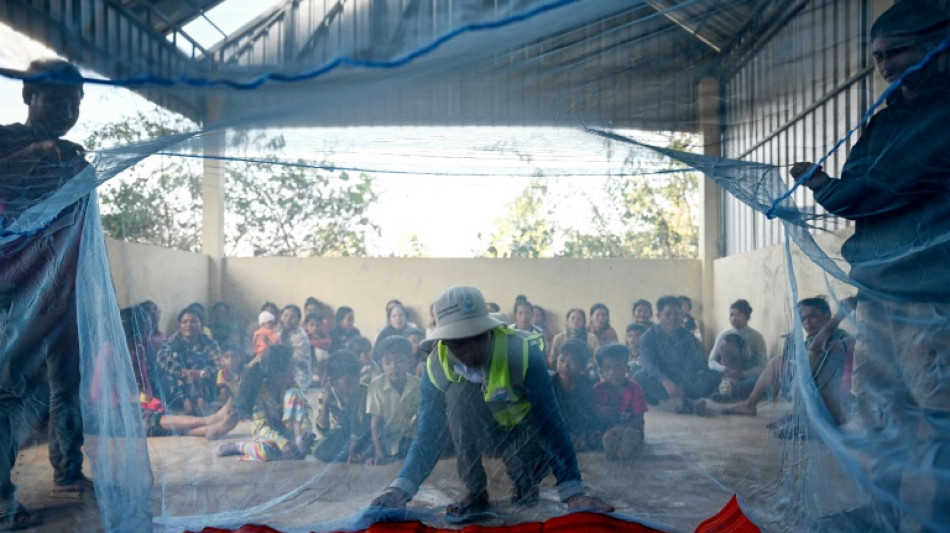
-
 Leo XIV celebrates first Christmas as pope
Leo XIV celebrates first Christmas as pope
-
Diallo and Mahrez strike at AFCON as Ivory Coast, Algeria win

-
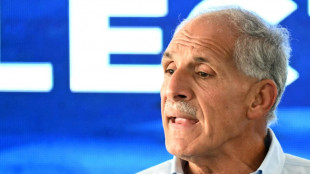 'At your service!' Nasry Asfura becomes Honduran president-elect
'At your service!' Nasry Asfura becomes Honduran president-elect
-
Trump-backed Nasry Asfura declared winner of Honduras presidency

-
 Diallo strikes to give AFCON holders Ivory Coast winning start
Diallo strikes to give AFCON holders Ivory Coast winning start
-
Spurs captain Romero facing increased ban after Liverpool red card

-
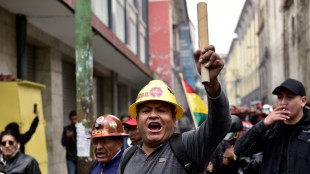 Bolivian miners protest elimination of fuel subsidies
Bolivian miners protest elimination of fuel subsidies
-
A lack of respect? African football bows to pressure with AFCON change

-
 Trump says comedian Colbert should be 'put to sleep'
Trump says comedian Colbert should be 'put to sleep'
-
Mahrez leads Algeria to AFCON cruise against Sudan

-
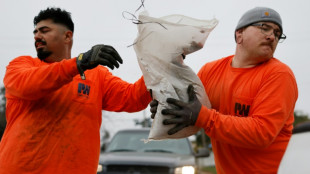 Southern California braces for devastating Christmas storm
Southern California braces for devastating Christmas storm
-
Amorim wants Man Utd players to cover 'irreplaceable' Fernandes

-
 First Bond game in a decade hit by two-month delay
First Bond game in a decade hit by two-month delay
-
Brazil's imprisoned Bolsonaro hospitalized ahead of surgery

-
 Serbia court drops case against ex-minister over train station disaster
Serbia court drops case against ex-minister over train station disaster
-
Investors watching for Santa rally in thin pre-Christmas trade

-
 David Sacks: Trump's AI power broker
David Sacks: Trump's AI power broker
-
Delap and Estevao in line for Chelsea return against Aston Villa

-
 Why metal prices are soaring to record highs
Why metal prices are soaring to record highs
-
Stocks tepid in thin pre-Christmas trade

-
 UN experts slam US blockade on Venezuela
UN experts slam US blockade on Venezuela
-
Bethlehem celebrates first festive Christmas since Gaza war

-
 Set-piece weakness costing Liverpool dear, says Slot
Set-piece weakness costing Liverpool dear, says Slot
-
Two police killed in explosion in Moscow
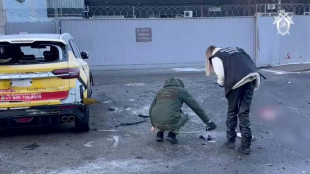
-
 EU 'strongly condemns' US sanctions against five Europeans
EU 'strongly condemns' US sanctions against five Europeans
-
Arsenal's Kepa Arrizabalaga eager for more League Cup heroics against Che;sea

-
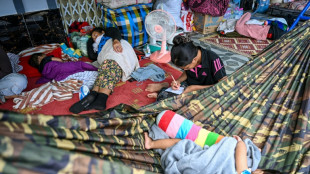 Thailand-Cambodia border talks proceed after venue row
Thailand-Cambodia border talks proceed after venue row
-
Kosovo, Serbia 'need to normalise' relations: Kosovo PM to AFP

-
 Newcastle boss Howe takes no comfort from recent Man Utd record
Newcastle boss Howe takes no comfort from recent Man Utd record
-
Frank warns squad to be 'grown-up' as Spurs players get Christmas Day off

-
 Rome pushes Meta to allow other AIs on WhatsApp
Rome pushes Meta to allow other AIs on WhatsApp
-
Black box recovered from Libyan general's crashed plane

-
 Festive lights, security tight for Christmas in Damascus
Festive lights, security tight for Christmas in Damascus
-
Zelensky reveals US-Ukraine plan to end Russian war, key questions remain
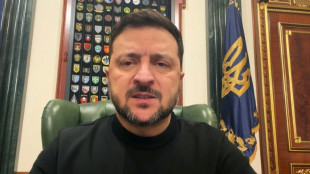
-
 El Salvador defends mega-prison key to Trump deportations
El Salvador defends mega-prison key to Trump deportations
-
Stranger Things set for final bow: five things to know

-
 Grief, trauma weigh on survivors of catastrophic Hong Kong fire
Grief, trauma weigh on survivors of catastrophic Hong Kong fire
-
Asian markets mixed after US growth data fuels Wall St record

-
 Stokes says England player welfare his main priority
Stokes says England player welfare his main priority
-
Australia's Lyon determined to bounce back after surgery
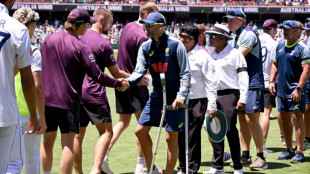
-
 Stokes says England players' welfare his main priority
Stokes says England players' welfare his main priority
-
North Korean POWs in Ukraine seeking 'new life' in South

-
 Japanese golf star 'Jumbo' Ozaki dies aged 78
Japanese golf star 'Jumbo' Ozaki dies aged 78
-
Johnson, Castle shine as Spurs rout Thunder

-
 Thai border clashes hit tourism at Cambodia's Angkor temples
Thai border clashes hit tourism at Cambodia's Angkor temples
-
From predator to plate: Japan bear crisis sparks culinary craze
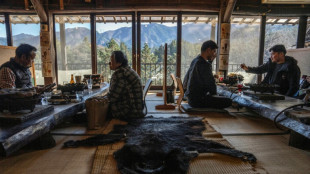
-
 Asian markets mostly up after US growth fuels Wall St record
Asian markets mostly up after US growth fuels Wall St record
-
'Happy milestone': Pakistan's historic brewery cheers export licence

-
 Chevron: the only foreign oil company left in Venezuela
Chevron: the only foreign oil company left in Venezuela
-
US denies visas to EU ex-commissioner, four others over tech rules


Cambodia nears Khmer Rouge survivor's dream of eradicating malaria
Cambodian scientist Yeang Chheang has spent six decades fighting malaria -- even in the Khmer Rouge labour camp where his wife and baby died -- and stands tantalisingly close to fulfilling his life's work.
The kingdom is stepping up a "last mile" push to wipe out the mosquito-borne disease, focusing on hard-to-reach communities in remote, forested or mountainous areas.
From 170,000 cases and 865 deaths from malaria in 1997, only 355 cases were recorded last year -- and not a single fatality has been reported since 2018.
The hope is for zero cases this year -- a remarkable turnaround for a country that was formerly an epicentre of multi-drug resistant strains. And the landmark would be unthinkable without the work of Yeang Chheang, who rebuilt the malaria control programme after the fall of the Khmer Rouge.
The communist regime murdered, starved or worked to death around two million people during its 1975-79 rule -- including Yeang Chheang's three brothers, sister, mother, wife and son.
Aged 17, he began training as Cambodia's first medical entomologist with a French expert in 1954.
He helped with the first malaria elimination pilot project, setting up a lab under a leaf-roofed office, catching mosquitoes and larvae for experiments when he was deployed to a malaria hotspot in the northeast in the 1960s.
"When we started the work, it was so difficult because we lacked people with good knowledge," the 87-year-old told AFP from his home in Phnom Penh.
- Starved to death -
When the Khmer Rouge took power, Yeang Chheang and his family were sent from Phnom Penh to a labour camp where his wife and baby son starved to death.
Despite fearing for his life, he continued treating malaria patients, secretly handing out pills he had picked up from piles of medicine dumped in the streets when he left Phnom Penh.
That could have seen him killed for violating Khmer Rouge rules.
But the cadres spared him after a top commander fell sick with malaria.
"Because of my medicines, I could survive and did not have to work hard carrying soil or digging canals," Yeang Chheang said.
"The tablets saved our lives," he added, referring to himself and his three other sons.
After the Khmer Rouge was ousted in 1979, he joined with a handful of others to restore the national malaria control programme.
There were multiple outbreaks in subsequent years, and he led his team on foot through villages riddled with landmines in the former Khmer Rouge stronghold of Pailin, a hotpsot for drug-resistant malaria.
- 'Last inch' -
Malaria, caused by parasites transmitted via mosquitoes, was for decades a major cause of illness and death in Cambodia.
The government launched a national action plan in 2011, aiming to eliminate all cases in the country by 2025.
Within three years the kingdom stopped drug-resistant malaria, and in 2020 launched the so-called "last mile" efforts.
Nearly two-thirds of last year's reported cases were in the remote northeast, where local volunteers have signed up to help.
Nhoun Niyok, 37, joined the campaign a decade ago in Pu Kesh village in Mondulkiri province.
He carries out rapid tests, administers medicines and advises people on using insecticide-treated mosquito nets to protect themselves.
"I am so happy I could help my community and I think villagers won't be sick with malaria again," he said.
He last recorded a malaria case in his village in September.
"Perhaps, the dream will come true," he said. "It looks like malaria will be gone soon."
If there are no malaria cases this year, Cambodia would need to sustain zero indigenous infections for another three consecutive years from 2026 to be certified as malaria-free by the World Health Organization (WHO).
Success would make it only the second country in continental Asia to achieve the feat, after China.
"This year, we are entering the last inch, not last mile anymore," Huy Rekol, director of the National Center for Parasitology, Entomology and Malaria Control, told AFP.
Marianna Trias, the WHO representative to Cambodia, added that certification would set "a powerful example for other countries, inspiring them to pursue the same goal".
Experts warn climate change and cross-border transmission involving migrants and mobile populations could yet derail Cambodia's efforts.
And some of its initiatives were funded by the US Agency for International Development (USAID), with no clarity yet on whether they will be impacted by the Trump administration's aid freeze.
There were an estimated 263 million malaria cases worldwide in 2023 -- up 11 million on the previous year -- and 597,000 deaths, according to the WHO.
Despite Cambodia's success, Yeang Chheang considers global elimination of the disease "absolutely impossible" due to human migration.
"It will be around," he said. "I believe it won't be totally eliminated."
Y.Aukaiv--AMWN


